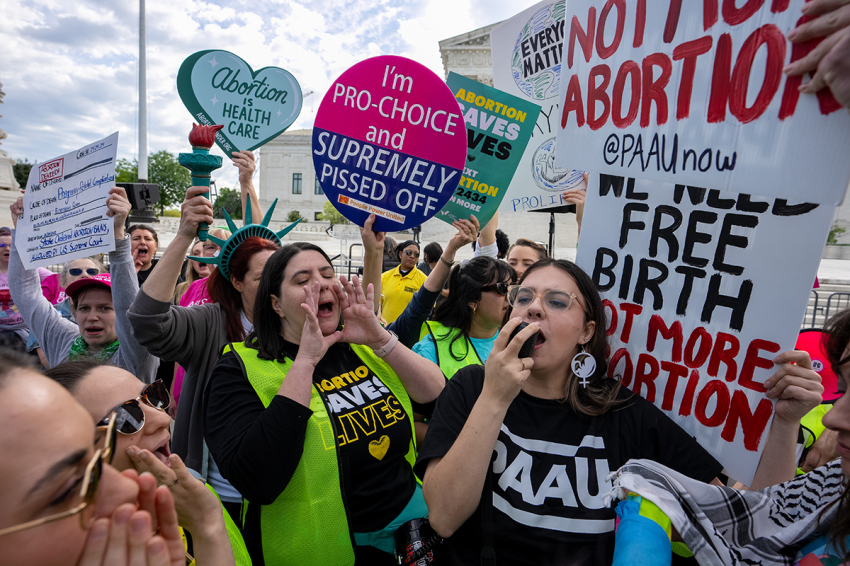Montana Supreme Court rules parental notification for abortion law unconstitutional

The Montana Supreme Court has struck down a law requiring parental notification before minors can have an abortion as the debate about the legality of abortion is expected to continue in the state and nationwide.
In a decision Wednesday, the Montana Supreme Court upheld a lower court ruling invalidating the Parental Consent for Abortion Act of 2013. The law never took effect, as it has been involved in litigation for over a decade.
A district court ruled that the law, which would prohibit the performance of abortions on minors without parental consent as provided on a form that also informs the parent and the minor about possible risks posed by an abortion, violated a right to privacy guaranteed by Article II, Section 10 of the Montana Constitution. The Montana Supreme Court opinion, written by Justice Laurie McKinnon, agreed with the lower court's analysis.
While acknowledging that "the State has a substantial interest in preserving the family, protecting minors, and protecting the rights of parents to raise their children," McKinnon concluded that such concerns do not outweigh "the right of a minor to make the most intimate and personal decision of whether to carry a child to term."
"Because a minor's right to control her reproductive decisions is among the most fundamental of the rights she possesses, and because the State has failed to demonstrate a real and significant relationship between the statutory classification and the ends asserted, we hold that the Consent Act violates the Constitution of the State of Montana," she added.
Montana's Republican Gov. Greg Gianforte slammed the decision in a statement.
"As a strong defender of parental rights, I'm deeply disappointed by today's ruling from the Montana Supreme Court, which states parents do not have a fundamental right to oversee the medical care of their young daughters," he said. "In its ruling, the Court has wielded its gavel like a hammer against one of the most fundamental rights in history: the right of parents to consent to the medical care of their children."
Planned Parenthood of Montana, the state's affiliate of the nation's largest abortion provider that sued to block the law from taking effect, celebrated the decision.
"We are pleased that the Court upheld the fundamental rights of Montanans today," Planned Parenthood of Montana CEO Martha Fuller said in a statement Wednesday.
"Montanans deserve the ability to make private medical decisions and have the ability to access abortion care if that is what is best for patients and families."
The ruling comes as Montana voters will likely weigh in on a ballot measure that would formally establish a right to abortion in the state constitution.
According to the Montana Secretary of State's Office, Ballot Issue 14 is gathering signatures to appear on the ballot in this fall's general election. The submitter of the bill, Dr. Samuel Dickman, is one of the plaintiffs in the case that successfully sought to invalidate the state law requiring parental notification for abortion.
The text of Ballot Issue 14 states, "There is a right to make and carry out decisions about one's own pregnancy, including the right to abortion." The proposed constitutional amendment clarifies, "This right shall not be denied or burdened unless justified by a compelling government interest achieved by the least restrictive means."
To secure a place on the ballot, the proposal must obtain signatures from 10% of the total number of registered voters in Montana, including 10% of registered voters in at least 40 of the state's legislative house districts. The most recent statistics compiled by the Montana Secretary of State's Office show 762,944 registered voters in the state.
Montanans for Reproductive Freedom, the group behind the ballot measure, released a statement on X late last month indicating that it had "met the valid signature threshold and the House District threshold required to qualify this critical initiative for the ballot." A subsequent X post noted, "Over 500 volunteers collected 117,000 signatures from every corner of the state."
The current Montana Supreme Court precedent makes abortion legal in the state. Montana is one of more than a dozen states where an abortion-related ballot measure will possibly or definitely go before voters later this year.
After the U.S. Supreme Court overturned the 1973 Roe v. Wade decision that legalized abortion nationwide in 2022, voters in four states have supported referendums establishing rights to abortion in their respective state constitutions in both 2022 and 2023: California, Michigan, Vermont and Ohio.
Ryan Foley is a reporter for The Christian Post. He can be reached at: ryan.foley@christianpost.com



























